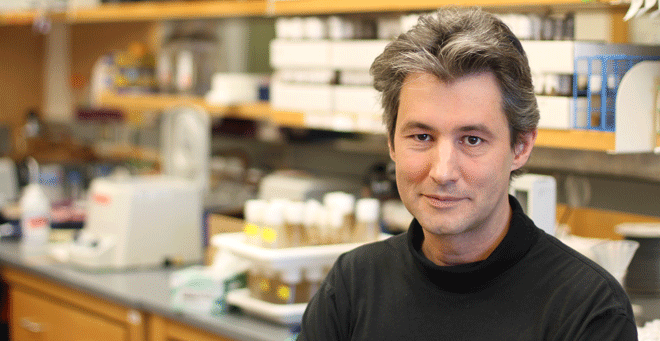 |
|
|
Patrick Emery, PhD |
An expert in the genetic mechanisms that control circadian rhythms in organisms, Patrick Emery, PhD, professor of neurobiology at UMass Medical School, had high praise for newly named Nobel Laureates Michael W. Young, PhD, of Rockefeller University, and Michael Rosbash, PhD, and Jeffrey C. Hall, PhD, of Brandeis University, who received the 2017 Nobel Prize in Physiology or Medicine for their discoveries of molecular mechanisms controlling the circadian rhythm. Dr. Emery completed his postdoctoral studies from 1997 to 2001 with Dr. Rosbash at Brandeis.
Emery said the work of Nobel Laureates “revealed how organisms cope with one of the most fundamental challenges of living on Earth: the 24-hour day-night cycle.”
“Remarkably, this mechanism is highly conserved in mammals,” Emery said. “In 2001, it was discovered that patients suffering from advanced sleep phase syndrome have a mutation in the human period2 gene, which is a homolog of Drosophila period. Their discovery, ultimately, could help coping with disruptions of circadian rhythms, such as those experienced by shift workers or travelers.”
He said most people think of circadian rhythms as the sleep-wake cycle, but actually most of bodily functions need to be adjusted to the time of day.
“Our cellular metabolism and our physiology are also under circadian control, not just our behavior,” he said.” “This is of course not limited to humans; most organisms on Earth use circadian clocks to cope with daily changes in their environment.”
In 1984, Young, Hall and Rosbash identified molecularly the first gene encoding a key cog of the Drosophila circadian clock: period. This seminal discovery was followed over the years by the identification of several other key proteins that with period generate a transcriptional cycle lasting 24 hours, which drives the rhythmic expression of hundreds, possibly thousands, of genes throughout the fly body.
Related story on UMassMedNow:
Patrick Emery receives $4.1M outstanding investigator award